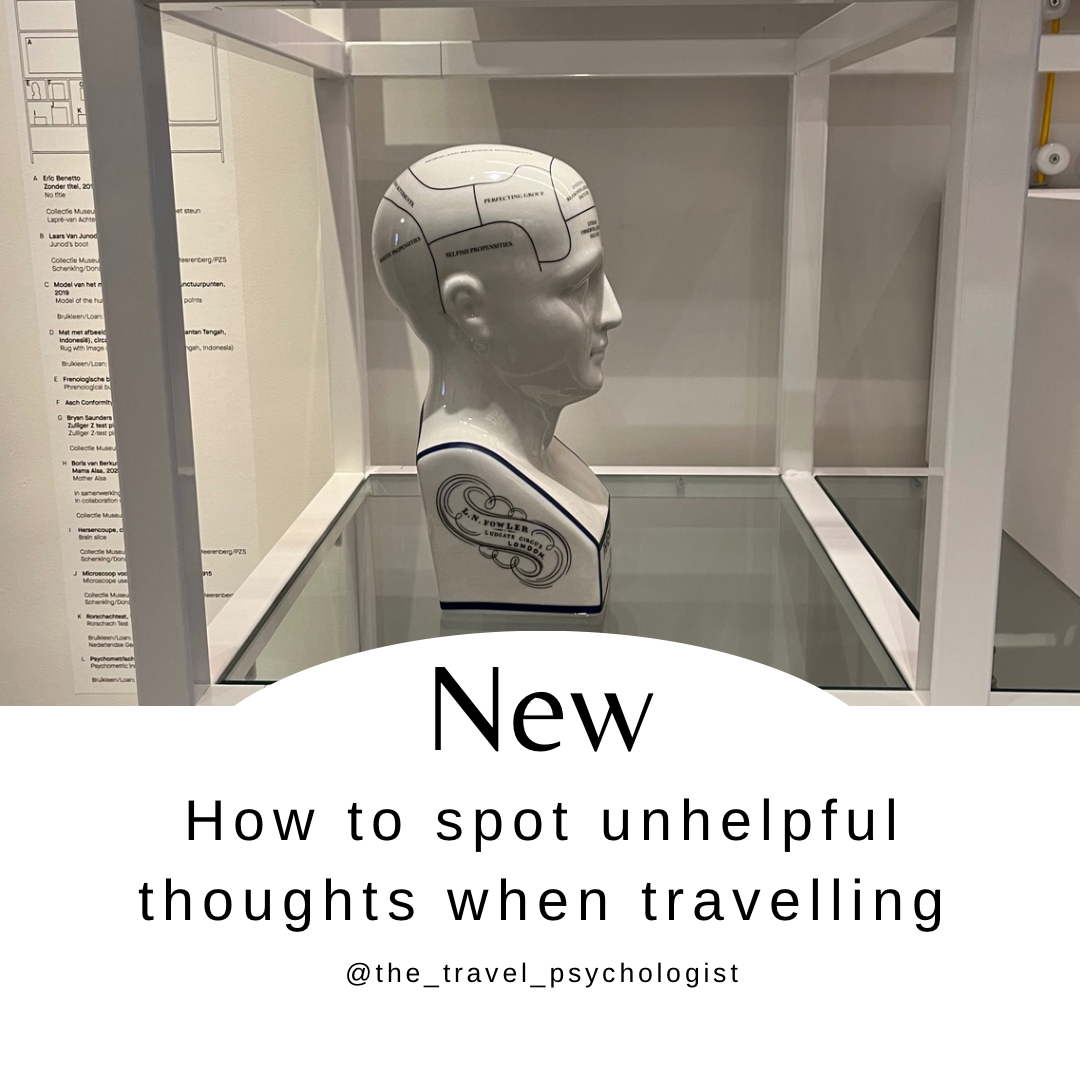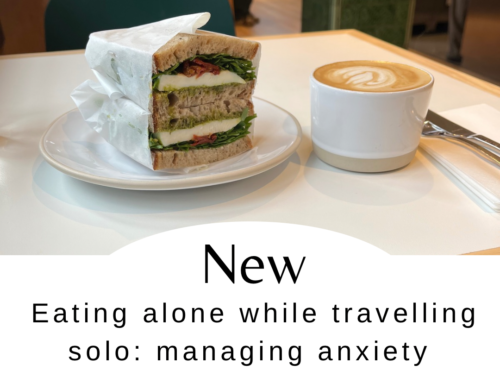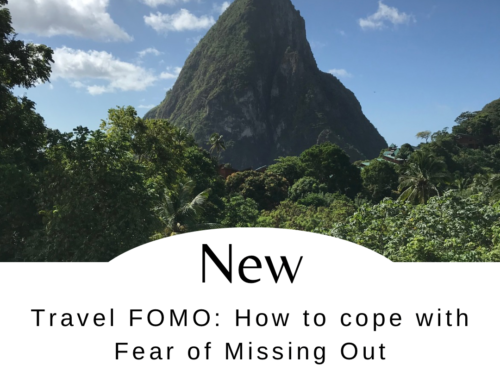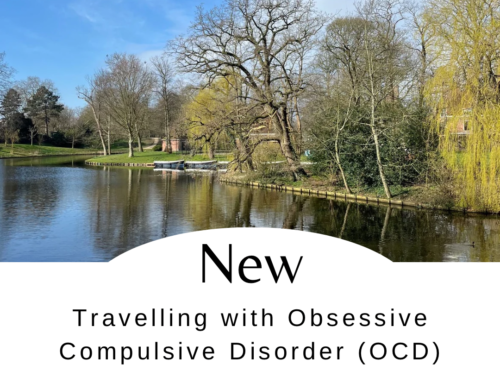Dr Charlotte Russell, Clinical Psychologist & Founder
Noticing and challenging Unhelpful Thinking is a cornerstone of Cognitive Behavioural Therapy (CBT). The rationale behind this is that if we notice and change or at least step back from unhelpful thinking, we can reduce unnecessary anxiety. We can also limit the negative effect that this unhelpful thinking can have on our mood.
Unhelpful thinking can lead to travel anxiety because our imaginations are powerful. If we think and believe something negative, our body starts to respond as if it is true. This often sets off our threat system and leads to anxiety. It can also lead to us feeling hopeless about the future or critical of ourselves, which can be detrimental for our mood.
Noticing and challenging thoughts sounds simple but can be very effective. It is one of the reasons why CBT is so popular and is often the first talking therapy offered to clients. We all think in an unhelpful way sometimes: CBT teaches us to notice when this happens and to step away from unhelpful thinking so that we can think in a more balanced and realistic way.
So with this in mind, lets look at some of the types of unhelpful thinking that might show up on your holiday. Learning to notice these unhelpful thoughts can stop them from getting in the way of enjoying your trip, and help with your well-being.
Catastrophising
Catastrophic thoughts are those classic ‘thinking the worst’ thoughts. They are when your mind jumps several steps ahead to thoughts of something bad happening. Uncertainty can be a trigger for this happening; when we are faced with uncertainty and so our mind goes to the worst possible scenario as a way of protecting ourselves.
These thoughts are usually worst-case scenario and are usually not helpful. These are examples of catastrophic thoughts whilst travelling
Something bad happening
“What if my plane crashes?”
“What if the hotel owner steals my passport?”
“What if my house burns down while I’m away?”
“Someone might have planted drugs in my suitcase”
“What if I get robbed?”
Thoughts about our own coping
“I’ll never be able to cope”
“If the airport/bus station is busy, I’ll panic”
“I won’t be able to cope if there is turbulence”
Health related catastrophising
Long distance travel and jet lag can cause physical symptoms as our bodies adjust. Sometimes these physical symptoms can trigger catastrophic thoughts:
“There is something wrong with me”
“What if I have a heart attack/ feint / collapse?”
“I’ve got a headache/diarrhoea/nausea which must mean there is something wrong with me”
Compare & despair
This is when we see the positive in other people and the negative in ourselves. Social media can be a particular trigger for these kinds of thoughts because people only tend to share the best bits of their lives. This can create unrealistic expectations about what is a holiday might look like and be like for most people.
“Other people can afford to stay at better hotels”
“Other people know what they’re doing and I don’t”
“Everyone else looks like they’re having a great time and I’m not..” for more on this check out Expectations and holidays: Finding the balance
“Everyone else looks thinner/better than me in my bikini” for more on this check out How can I overcome body-consciousness on holiday?
Mindreading
This is when we interpret what other people might be thinking without asking them or them telling us. We are not as good at this as we think we are!
For example, if our travel companion is quiet, we might conclude that they are thinking something negative about us our that we have upset them. In reality it might be that they are not feeling well or they are thinking about something else.
Examples of these kinds of thoughts include:
“My friend/partner would rather be travelling with someone else”
“My friend/partner thinks I’m boring”
“My friend/partner will judge me if I want to go somewhere cheaper for dinner”
Clear communication is really important to manage these kinds of thoughts. For more on this check out my guides on Travelling together as a couple and How do I get along with my friends on vacation?
We might also have fears about what local people might think of us, for example
“What if I try to speak the language and I sound like an idiot / make a mistake?”
“What if people make judgements about me because of my nationality?” (e.g ‘Brits abroad’ stereotypes)
Judgements
A judgement is when we make an overall conclusion about a situation, person or ourselves. Here are some travel related examples:
“I’m boring for wanting to spend some time at the hotel/go to a museum”
“That hotel was awful”
“That performance was rubbish”
“This place not like it used to be, it has changed for the worse” for more on this check out How to adjust to travelling in a changing world
For an interesting perspective on judgements and why they are unhelpful for us check out Why Judging Others Is Bad for You | Psychology Today
Black and white thinking
Black and white thinking is when we judge things as being all good or all bad, and for that reason it is sometimes called ‘all or nothing thinking’. This is unhelpful because travel inevitable comes with some ups and downs. It is likely that you will be faced with delays or disappointments at some point on your trip, even on the best trips. For that reason it is helpful to try to see the positives even if there has been a lot that has gone wrong.
Examples of black and white thinking include:
“This trip is a complete disaster”
“Things never go right for me”
“I’ve made the wrong decision coming here”
“I’ve wasted so much money on this trip”
If you notice these thoughts check out my previous guide How can I make the most of a disappointing trip?
Conclusions
Have you noticed any of these unhelpful thoughts when you have travelled? I certainly have!
We all experience these kinds of thoughts and we can learn to notice and step back from them. This can help us to think in a more balanced and realistic way and prevent unnecessary anxiety.
If you are interested in finding more about CBT check out this guide from Mind What is cognitive behavioural therapy (CBT)? – Mind
If you are interested in accessing private therapy check out my guide How to choose the right therapist





